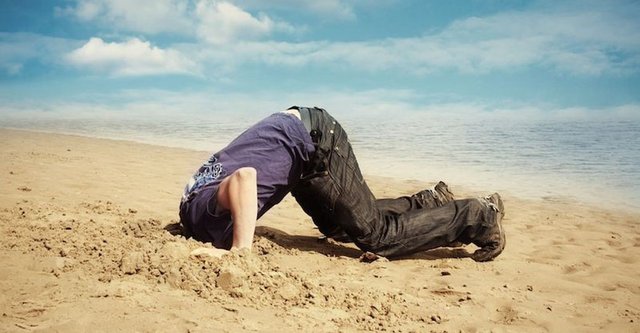"We are geniuses at inventing reasons to avoid change. It is much easier, and more fun to attack the strategy of the person who's trying to help than to try to solve the problem".

That genius becomes more acute when it applies to us - when its our turn to change how we behave. We fall back on a set of beliefs that trigger denial, resistance, and ultimately self-delusion.
- We don't exercise because its boring or we're too busy
- We're late for work because of traffic
- We hurt someone because we didn't have a choice
These excuses, basically variations on "the dog ate my homework" , are so abused it's a wonder anyone believes us (even when we're telling the truth). Our inner beliefs trigger failure before it happens. They sabotage lasting change by cancelling its possibility, We employ these beliefs as articles of faith to justify our inaction and then wish away the result.
1. If I understand, I will do
There's a difference between understanding and doing. Just because people understand what to do, doesn't ensure that they will actually do it. this belief triggers Confusion
2. I have the willpower and won't give in to temptation
Few of us foresee the challenges we will face. as a result the willpower we assume when we set a goal rarely measures up to the willpower we display in achieving that goal. something always comes up to sink our boat. this belief triggers Overconfidence
3. Today is a special day
Excusing our momentary lapses as an outlier event triggers a self-indulgent Inconsistency, which is fatal for change. Successful change doesn't happen overnight.
4. At least I'm better than...
We award ourselves free pass because we're not the worst in the world. This is our excuse to take it easy, lowering the bar on our motivation and discipline. Other people have to change more than we do. We've triggered A false sense of immunity
5. I shouldn't need help and structure
When we presume that we are better than people who need structure and guidance, it trigger an unappealing exceptionalism in us and hence, we lack one of the most crucial ingredient for change: Humility
6. I won't get tired and my enthusiasm will not fade
We seldom recognize the self-control is limited resource. As we become tired our self-control begins to waver and may eventually disappear. the sheer effort of sticking with the plan triggers Depletion.
7. I have all the time in the world
We underestimate the time it takes to get anything done and we believe that time is open-ended and sufficiently spacious for us to get to all our self-improvement goals eventually. This faith in time's infinite patience triggers Procrastination
8. I won't get distracted and nothing unexpected will occur
When we make plans for the future, we seldom plan on distractions. We plan as if we are going to live in a perfect world. We don't plan for low-probability events because, by definition, any one of them is unlikely to occur. this belief triggers Unrealistic expectations.
9. An epiphany will suddenly change my life
An epiphany implies that change can arise out of a sudden burst of insight and willpower, it happens, of course. But more often than not, an epiphany triggers Magical thinking. This process is based on impulse rather than strategy, hopes and prayers rather than structure.
10. My change will be permanent and I will never have to worry again
The Great Western Disease is "I'll be happy when..."This is our belief that happiness is static and finite goal, within our grasp when we get that promotion, or buy that house, or find that mate. This belief triggers a false sense of Permanence
11. My elimination of old problems will not bring on new problems
We forget that as we usher an old problem out the door, a new problem usually enters. This belief triggers a fundamental misunderstanding of our Future challenges.
12. My efforts will be fairly rewarded
From childhood we are brought up to believe that life is supposed to be fair. Our noble efforts and good works will be rewarded. When we are not properly rewarded we feel cheated. Our dashed expectations triggers Resentment. Getting better is its own reward, If we do this, we can never feel cheated ever again.
13. No one is paying attention to me
We believe that we can occasionally lapse back into bad behavior because people aren't paying close attention. We are practically invisible, triggering a dangerous preference for Isolation. When we revert to our previous behavior, people always notice.
14. If I change I am "inauthentic"
Many of us have a misguided belief that how we behave today not only defines us but represents our fixed and constant selves, the authentic us forever. If we change, we are somehow not being true to who we really are. this belief triggers Stubbornness. We refuse to adapt our behavior to new situations simply because "it isn't me".
15. I have the wisdom to assess my own behavior
We are notoriously inaccurate in assessing ourselves. we tend to credit ourselves for our victories and blame our situation or other people for our losses. this belief triggers an impaired sense of Objectivity. it convinces us that while other people consistently overrate themselves, our own self-assessment is always fair and accurate.
Overconfidence. Stubbornness. Magical thinking. Confusion. Resentment. Procrastination. That's a lot of heavy baggage to carry on. All these rationalizations, some profound, some silly, still don't completely answer the larger question. There is an even larger reason that explains why we don't make the changes we want to make - greater than the high quality of our excuses or our devotion to our belief triggers. It's called the Environment.
Goldsmith, Marshall. Triggers. Profile Books Ltd, 2016